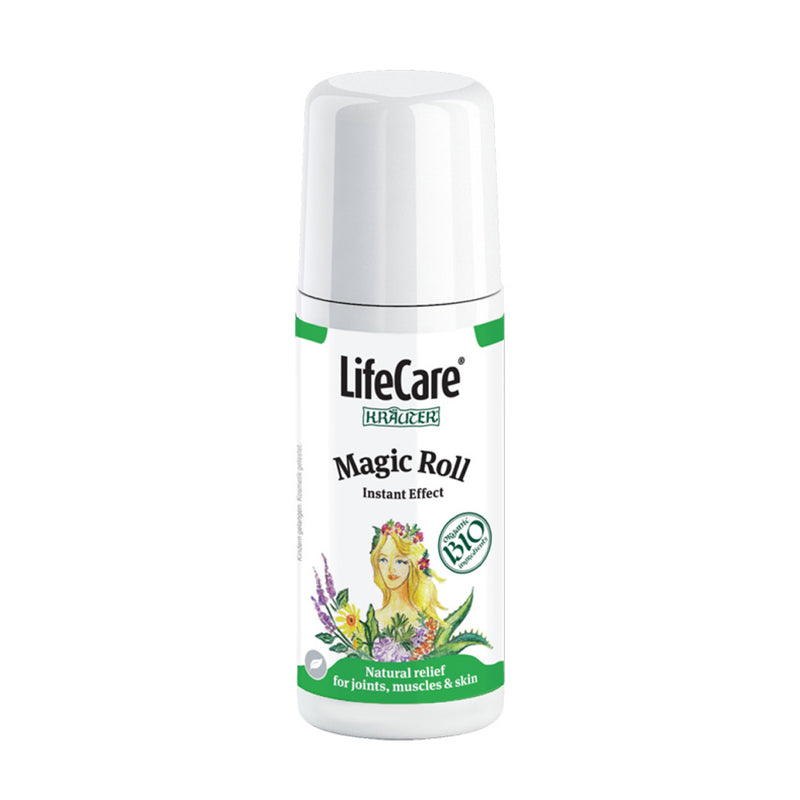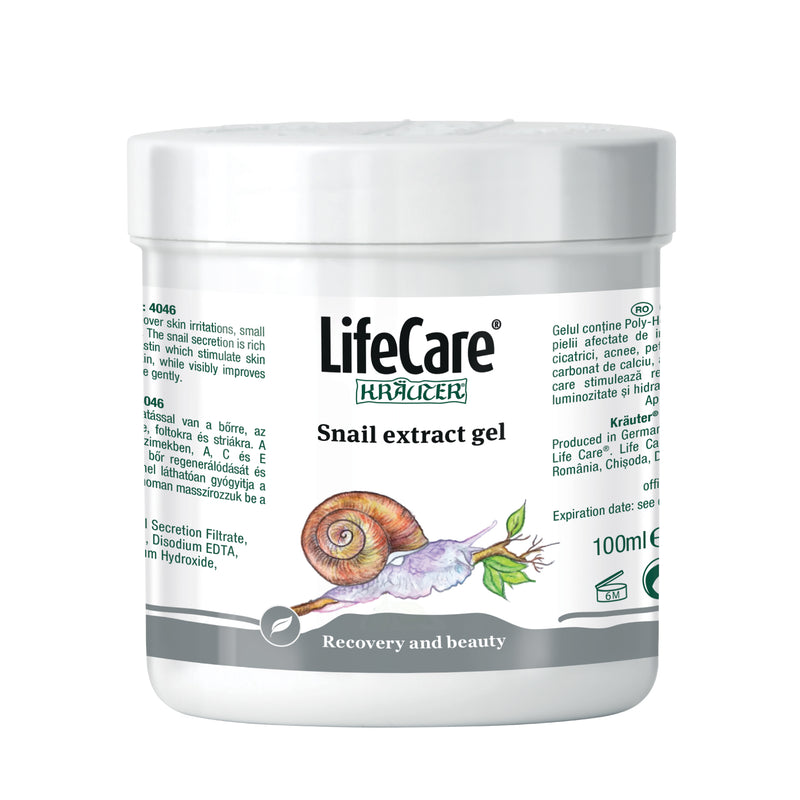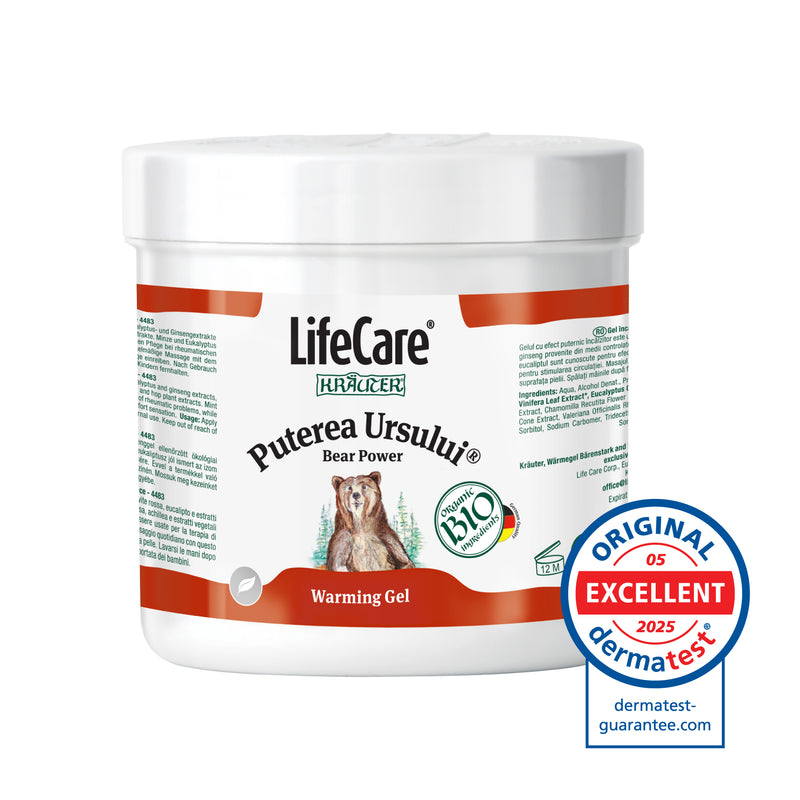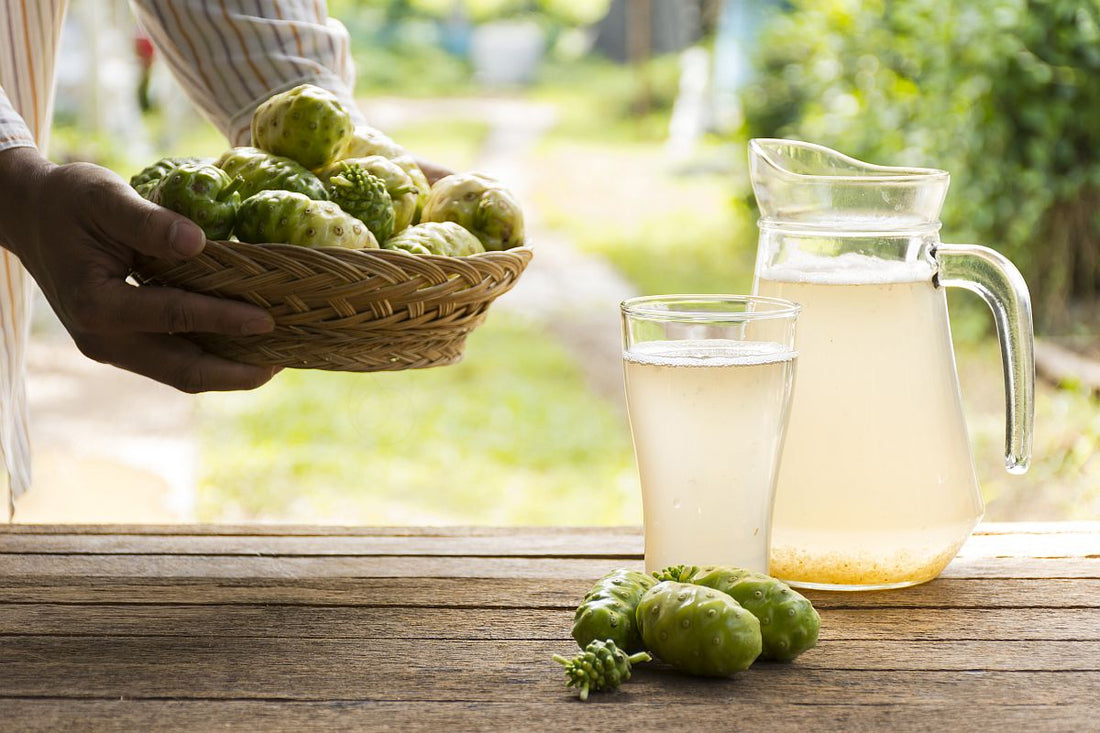Noni fruit, scientifically known as Morinda Citrifolia, is originally from the tropical areas of Southeast Asia and the Pacific Islands, being used for centuries in traditional medicine. Over time, the juice obtained from this fruit has gained popularity worldwide due to its beneficial properties for health.
The Noni tree grows at a height of about 3-10 meters in the tropical regions. The leaves and its fruit are considered traditional foods in the crops in the areas in which it grows.
Here's what topics we will cover in this article:
1. What are the most important substances in Noni and what role they play?
2. Noni juice benefits
3. What conditions do Noni cure?
4. Noni's contraindications
5. Noni recipes
6. Noni juice for children and adults
7. Conclusion
1. What are the most important substances in Noni and what role they play?
Noni is a fruit that has been used in traditional medicine in different cultures, especially in Southeast Asia and Polynesia. Noni active substances have been studied for their possible health benefits and include:
- Polysaccharides: Complex carbohydrates that can support the immune system and have effects on immunity and anti -inflammatory.
- Scopolamine: a phenolic compound that has antioxidant, anti -inflammatory and antitumor properties. It can contribute to cell protection and reduce oxidative stress.
- Xeronine: an alkaloid that influences the activity of enzymes in the body, helping to regulate cell processes and maintain metabolic balance.
- vitamins and minerals: Noni Contains essential vitamins such as vitamin C, vitamin A and vitamins in complex B, as well as minerals such as potassium, calcium and magnesium, which are essential for the general health of the body and for its optimal functioning. Vitamin C is a powerful antioxidant that contributes to stimulating the production of white blood cells, essential in the fight against infections. Vitamin C is also involved in the processes of tissue repair and in protecting the body from the harmful effects of oxidative stress.
-Essential fatty acids: Noni contains Omega-3 and Omega-6 fatty acids, which are important for cardiovascular health and cognitive function.
- Polyphenols and flavonoids: they have anti -inflammatory and antimicrobial properties, helping to combat pathogens and reduce inflammation in the body. By reducing inflammation, Noni juice can support the optimal functioning of the immune system.
- Alkaloids and iridoids: These bioactive substances are recognized for their ability to modulate immune responses, contributing to the balance of the immune system. Thus, Noni juice can help prevent excessive immune responses, which can lead to chronic inflammation and autoimmune diseases.
2. Noni juice benefits
Noni juice is recognized for its composition rich in nutrients, antioxidants and bioactive compounds that contribute to the improvement of general health.
According to nutritional data, a serving of 30 ml of pure and organic non -juice contains:
-calories: 5.1
-proteins: 0 grams (g)
-fats: 0 g
-carbohydrates: 1 g
-fibers: 0 g
-sugars: 1 g
- Sodium: 5.1 mg
- Vitamin C: 9 mg
An older study of 2006, published in the International Journal of Food Sciences and Nutrition, analyzed the various levels of minerals in over 177 noni juices on the market and found that in all there were, among other nutrients, and:
- iron
- calcium
- potassium
-copper
-Magnesium
-Sodium
-Zinc
-phosphorus
-selenium
The study also notes that potassium content is usually the highest of the minerals present in most types of non -juice.
Among the main benefits of Noni juice are:
-Reinforcement of the immune system: Due to the high content of antioxidants and vitamins, Noni juice helps to strengthen the immune system, protecting the body against infections and diseases. By strengthening the natural barrier of the body and stimulating the activity of immune cells, noni juice can help prevent and combat common infections, such as colds or flu.
Regular consumption of Noni juice can support the body in the recovery process after infections or other conditions, due to its revitalizing and immunostimulatory properties.
-anti -inflammatory properties: Noni contains compounds with anti -inflammatory effect that can help reduce inflammation and pain, useful for arthritis and other inflammatory diseases. For example, in a study that stretched over a period of one month, people with degenerative arthritis of the spine consumed 15 ml of noni juice twice a day. The group that consumed Noni juice reported a significantly lower pain score - with a complete neck pain reduction to 60% of participants.
-Supporting cardiovascular health: Noni juice can contribute to lower blood pressure and improve blood circulation, thus reducing the risk of cardiovascular disease.
-antioxidant properties: rich in antioxidants, Noni It helps to combat oxidative stress and free radicals, protecting the cells of the body from damage and slowing the aging process. Noni provides high levels of phytochemicals and antioxidants, including:
- flavonoids
- Lignani
- iridoids
- Anthrachinone
- Cumarins
- terpenoids
- sterols
- fatty acids
- polysaccharides
-Improvement of digestion: Noni juice can improve digestive problems, such as constipation, by balancing the intestinal flora and stimulating intestinal transit.
-Reducing stress and anxiety: the consumption of Noni It can have a calming effect on the nervous system, reducing the level of stress and anxiety. Cortisol is known as the "stress hormone", and increased levels can lead to anxiety and mental health problems.
Studies suggest that Noni juice can positively influence cortisol levels in the blood, contributing to reducing the sensation of stress and anxiety.
-Supporting skin health: Local application or consumption of noni juice can help to cure wounds, eczema and other skin conditions, due to antibacterial and anti -inflammatory properties.
-Glicemia regulation: Some studies suggest that Noni juice can contribute to maintaining normal blood sugar levels, being beneficial for people with diabetes. Another recent study focused on the anti-diabetic potential of Noni juice. He pointed out that Noni can help regulate blood sugar level and improve insulin sensitivity.
-Improvement of energy and physical resistance: Regular consumption of Noni can increase the energy level and improve physical resistance, being beneficial for athletes and active people, but also to those suffering from anemia or certain nutritional deficiencies.
-anticancer properties: Although studies are still in progress, there is preliminary evidence that certain noni compounds can inhibit cancer cell growth, offering additional potential in cancer prevention. A 2022 study investigated the effects of noni juice on lung cancer cells.
It has been found that Noni juice could inhibit tumor growth by blocking the AKT/NF-κB signaling path, which is essential for the survival and proliferation of cancer cells. This suggests that Noni juice could be a complementary treatment option for certain types of cancer, although more clinical studies are needed to confirm 100% people's effects.
- can support weight loss: Research published in Nutrients notes that when you consume noni juice, there have been some effects that could help to lose weight, including: decreased levels of giant (a gastric hormone that regulates appetite), which helps the body to feel the feeling of satiety after a meal, prevention, weight gain, weight loss, weight loss Improving metabolic health markers, such as blood sugar and insulin tolerance.
3. What conditions do Noni cure?
Over time, Noni has been used in traditional medicine to treat a variety of conditions. These include:
- infections: Due to its antimicrobial properties, Noni has been used to combat bacterial and viral infections.
- Respiratory problems: Noni can help relieve asthma, bronchitis and other respiratory conditions. It has expectorant and soothing effects on the airways.
- skin diseases: Local application of Noni juice can help heal wounds, eczema and other skin problems.
- can reduce cell damage caused by tobacco smoke: Noni juice can reduce cell damage - especially those caused by tobacco smoke. Exposure to tobacco smoke generates dangerous amounts of free radicals. Excessive quantities can cause cellular damage and can lead to oxidative stress. In one study, the stiff smokers received 118 ml of non-day juice. After a month, they experienced a 30% discount on two common free radicals, compared to the initial levels.
- Diseases of the urinary system: Noni juice is also used to support the health of the urinary system, including to prevent urinary tract infections and support kidney function.
- cell regeneration and anti -aging effect: Noni is known for its antioxidant properties, which can help protect cells from oxidative damage and slow down the cell aging process.
- Cardiovascular Health: Noni juice can have beneficial effects on cardiovascular health, including lowering cholesterol and improving blood circulation.
- inflammation and joint pain: Noni juice contains compounds with anti -inflammatory properties, which can help reduce inflammation and joint pain. It is sometimes used in treatments for arthritis and other inflammatory conditions.
However, it is important to mention that Noni juice should not be considered an exclusive treatment and should be used in combination with other therapies prescribed by the specialist doctor, as a natural adjuvant in different conditions.
4. The contraindications of the Noni forehead
Although Noni juice is recognized for its many health benefits, it is important to consider the potential contraindications associated with the consumption of this fruit. Some people can experience adverse effects, especially if they have certain medical conditions or follow specific treatments. Here are some of the main contraindications of Noni fruit:
-kidney problems
Noni juice contains significant amounts of potassium, an essential mineral for the normal functioning of the body. However, for people with kidney disease, an increased potassium intake may be dangerous.
The affected kidneys cannot effectively eliminate excess potassium in the blood, which can lead to hyperkalaemia (excess potassium in the blood), a serious medical condition that can cause cardiac arrhythmia and other severe complications. For this reason, people with kidney disease must be extremely careful and avoid the consumption of noni without consulting the specialist doctor.
- drug interactions
Noni can interact with certain drugs, which can diminish their effectiveness or cause side effects.
> Medications for high blood pressure: Noni juice can interact with drugs that regulate blood pressure, affecting the electrolyte balance in the body.
> Anticoagulants: Noni can influence blood coagulation, which can be problematic for people with anticoagulant treatments, increasing the risk of bleeding. Therefore, it is essential for people who take such drugs to consult a specialist before introducing Noni into their diet.
- task and breastfeeding
During pregnancy and breastfeeding, women should be particularly careful about what they consume, because some foods and supplements can have unwanted effects on the baby or baby. Although Noni juice is used for centuries in traditional medicine, its effects on pregnancy have not been studied extensively. For this reason, pregnant or breastfeeding women should avoid the consumption of noni, to prevent any potential risk for their health or child.
Other considerations you have to keep in mind
Apart from the contraindications mentioned, it is important to be aware of other potential adverse effects or interactions that may appear:
> Allergies: People with allergies to exotic fruits should be cautious to non -consumption because they can develop allergic reactions
> Dosage: Excessive Noni consumption can lead to overdose of certain nutrients or compounds, which can cause gastrointestinal discomfort or other health problems.
Although Noni juice has many health benefits, the contraindications and potential risks associated with consumption should not be ignored, especially in people with pre -existing conditions or following drug treatments.
It is always advisable to consult a doctor before introducing noni juice into the daily diet, especially in vulnerable groups, such as pregnant women or people with kidney problems.
5. Noni recipes
Pure Noni juice has a bitter taste, which may not be to everyone's liking. Therefore, we recommend that you mix Noni juice with other ingredients, to create your own delicious mixture. It starts by adding a portion of non-juice in a glass of water (usually 30 ml of juice). From here, some simple ideas can make a more pleasant drink:
- Adding fruit juices such as apple, orange or pineapple
- adding natural sweeteners such as honey or maple syrup
- adding the mixture of noni juice in a smoothie.
And if you are interested in the nutritional value of Noni juice, here are the existing data for 30 ml of pure juice (without additions such as preservatives or sugars):
Calories: 6.30
Energy: 1.35
Carbohydrates: 1.55g
Proteins: 0.09g
Cholesterol: 0.00mg
Carbohydrates: 0.85g
Vitamin C: 1.69mg
Potassium: 6.96mg
Magnesium: 0.64mg
Sodium: 0.78mg
Calcium: 0.48mg
6. Noni juice for children and adults
Noni juice is recognized for its many health benefits. However, the mode of administration and dosage should be adjusted according to age, health and individual objectives. While adults can benefit from the regular consumption of noni juice, in the case of children, a much more cautious approach must be adopted.
- Noni juice for children
Regarding the administration of non -juice of children, there are some important considerations to consider. Although Noni juice has antioxidant and anti -inflammatory properties, studies that confirm its safety and efficacy in children are limited.
In particular, children under the age of 12 should avoid the consumption of non-juice, because their digestive and immune system is still in development, and the active compounds in Noni could interact in an unpredictable way.
Given the high potassium content of Noni juice, administration in children should be done very carefully. An excess of potassium can affect renal function, especially in children who already have health problems.
In cases where parents consider the use of noni juice in children, it is essential to consult a pediatric doctor first. In general, Noni juice should be avoided in children under 12, and for the elder, consumption should be strictly supervised and properly dosed.
- Noni juice for adults
Adults can benefit from Noni juice properties, but they must be aware of how it consumes it to avoid any adverse effects.
For adults, the usual daily dose of Noni juice is about 30 ml. It is recommended to start with a small amount to observe how the body reacts. Depending on the health objectives, the dose can be adjusted, but it is important not to exceed the recommended quantity without medical supervision.
Noni juice is known for its antioxidant, anti -inflammatory and immunomodulatory effects, which makes it useful in managing oxidative stress, improving digestion, supporting cardiovascular health and strengthening the immune system. Adults suffering from chronic diseases or who want to improve their general health can benefit from regular consumption of non -juice.
Although Noni juice is generally well tolerated by adults, those with renal problems, high blood pressure or following drug treatments (especially anticoagulants) should be cautious. It is recommended that these people consult a doctor before adding Noni juice to their diet.
When it comes to choosing Noni juice, quality is essential. It is important to look for a 100% natural product, without the additions of sugar or preservatives, preferably organic certificate. It is also good to check the origin of the fruit and the processing mode, to ensure that the nutritional benefits are kept intact.
Conclusion
Noni juice can bring many health benefits, but it is essential to be consumed with responsibility, taking into account any contraindications and interactions with other treatments. As always, consult a doctor before starting a new dietary supplement, especially if you have pre -existing conditions.
Article written by Andreea Corneanu, specialist marketing, Life who




